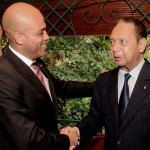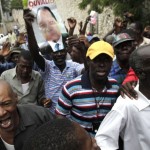In a deft and enlightened move, Martelly declared from the outset of his presidency that he wanted to make peace – not just with Aristide but with every other former Haitian leader as well. To this end he made quite a public show today of meeting with both Aristide and Baby Doc.
Implicit in this of course is that he will discourage any attempt to prosecute Baby Doc, and that Aristide will now be loath to challenge the legitimacy of his presidency. Beyond this, Martelly’s move is deft and enlightened because it lays the foundation for the kind of political certainty that is sine qua non for the foreign direct investments Haiti will need to rebuild.
 I made the observations above in an October 12, 2011 (Vol.VII) commentary, New Haitian president seeks reconciliation. Now comes this:
I made the observations above in an October 12, 2011 (Vol.VII) commentary, New Haitian president seeks reconciliation. Now comes this:
Haiti’s judicial authorities have dealt yet another blow to the victims of former leader Jean-Claude Duvalier, Amnesty International said this week after the criminal case against the former ‘president-for-life’ for grave human rights violations was dropped.
An investigating judge in Port-au-Prince on Monday announced that Jean-Claude ‘Baby Doc’ Duvalier will not stand trial for alleged crimes against humanity – including torture, disappearances and extrajudicial executions….
(amnesty.org, January 31, 2012)
 But let me hasten to clarify that nothing could be further from my mind than gloating here about my prescience; especially because nobody was initially more anxious to see Duvalier prosecuted than I. It’s just that, given the way President Martelly and the Haitian judiciary are being pilloried in the press, I think it’s important to put this decision to spare the country a war-crimes trial into context.
But let me hasten to clarify that nothing could be further from my mind than gloating here about my prescience; especially because nobody was initially more anxious to see Duvalier prosecuted than I. It’s just that, given the way President Martelly and the Haitian judiciary are being pilloried in the press, I think it’s important to put this decision to spare the country a war-crimes trial into context.
I fully appreciate the criticism that Haiti is opting for political expediency at the expense of criminal justice. But Martelly can point to similar criticisms that were leveled at South Africa’s Truth and Reconciliation Commission, which granted outright amnesty to many Whites who had the blood of the brutal Apartheid regime on their hands.
 Clearly Haiti could do a lot worse than to follow South Africa’s principled example. Moreover, Martelly was undoubtedly mindful that prosecuting Duvalier for war crimes would probably incite more factional violence in the streets of Haiti: believe it not Baby Doc still has rabid followers who would die for him. And in that event, nobody doubts that self-righteous organizations like Amnesty International would not be able to lift a finger to stop the bloodshed.
Clearly Haiti could do a lot worse than to follow South Africa’s principled example. Moreover, Martelly was undoubtedly mindful that prosecuting Duvalier for war crimes would probably incite more factional violence in the streets of Haiti: believe it not Baby Doc still has rabid followers who would die for him. And in that event, nobody doubts that self-righteous organizations like Amnesty International would not be able to lift a finger to stop the bloodshed.
Alas, putting Duvalier on trial for embezzlement of public funds (as the government intends to do) will provide little or no consolation. Not least because he probably has more than enough from the billions he embezzled to settle whatever damages are assessed.
All the same, my thoughts and prayers go out to all who were affected by the brutal reign of the Duvaliers. Even more, though, I wish the longsuffering people of Haiti an extended period of peace, happiness, and prosperity. I am convinced that foregoing a war-crimes trial will help this wish come true.
Related commentaries:
Return of Baby Doc
Return of Aristide